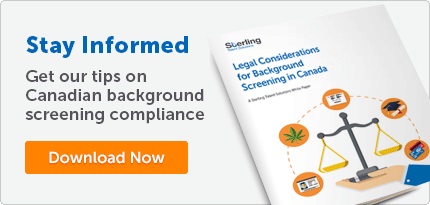
Technology is all around us. Technology has brought people together and made the world a much smaller place. But, in doing so, technology has stretched the limits of private space and what personal information can be disclosed to the masses. The challenge for companies is finding the right balance between an individual’s right to keep their information private and the need of organizations to collect, use or disclose personal information for legitimate business purposes. This is where compliance comes into play. Compliance, defined as “the act of conforming, acquiescing or yielding,” usually is used in conjunction with following a law or regulation. While compliance might not always be the most exciting of topics, it’s important for organizations to follow, especially those working with the public.
Legal Considerations for Background Screening in Canada
Background checks are subject to various rules set out in Canadian privacy, human rights and consumer reporting laws. Organizations need to be aware of their legal obligations and develop background check policies that take into account their particular needs, risk tolerance and legal obligations. Sterling Talent Solutions put together a guide, Legal Considerations for Background Screening in Canada of the various compliance considerations in Canada which affect employment background screening.
Privacy Laws
Privacy laws regulate the collection, use, disclosure and retention of personal information. Canada has many privacy laws, covering both public- and private-sector organizations. Non-compliance with privacy laws can result in time-consuming investigations by privacy commissioners and reports that may name the offending organization and harm its corporate image and brand. There are many general privacy concepts that need to be kept in mind when developing a background check program including:
- Notice and Consent – Privacy laws require that individuals be notified, and may require that they give consent that their personal information will be collected and used.
- Limiting Collection, Use, Disclosure and Retention – Each item of personal information collected must only be used for the purposes that were originally identified unless an individual has agreed otherwise. Personal records should not be retained forever but based on a business’s need and legal obligation.
- Accountability and Openness – Organizations must be prepared to answer questions about how they handle personal information. Having written policies in place can help reassure individuals that their privacy is taken seriously.
Human Rights Laws
Human rights laws exist in all jurisdictions in Canada. They are designed to prevent discrimination based on certain protected characteristics. Each jurisdiction (the ten provinces, three territories and the federal jurisdiction) has its own law with its own nuances, but many of the protected classes are similar. Some of the common protected classes include race, national or ethnic origin, sexual orientation, sex, gender identity, marital status, religion, age and disability. Some jurisdictions also protect criminal record information. Many other categories exist, and each jurisdiction defines these categories in different ways, so it is vital that organizations familiarize themselves with the laws that apply to them.
It is inevitable that organizations will come into contact with information identifying an applicant’s protected status during the recruitment, interview and background check process. Controls should be put in place to mitigate the risk of human rights law violations. Examples of sensitive information that could appear on a background check can come from social media searches, drug and alcohol testing or criminal records and police information.
Consumer Reporting Laws
Every province except New Brunswick has a law in place to regulate companies that create and deliver reports about individuals, including credit bureaus and background checking companies. These may be specific laws about “consumer reporting”, “credit reporting” or “personal investigations”, or may fall under general consumer protection legislation. In many ways, consumer reporting laws simply restate or strengthen some of the concepts in privacy law, like notice and consent, accuracy and the right to access personal information.
Stay Compliant with Sterling Talent Solutions
There are many laws, regulations and rules that govern the background screening industry. These laws aim to protect candidates when their personal information is used on an application and during background screening. To respect the rights of applicants and employees, organizations should be aware of their obligations and develop background checking policies that take into account their particular needs, risk tolerance and legal obligations. Since every organization has different hiring requirements, it is recommended to consult with legal counsel when creating and updating a background screening program. Find more detailed information about the legal framework behind background screening regulations by downloading our white paper, Legal Considerations for Background Screening in Canada.



